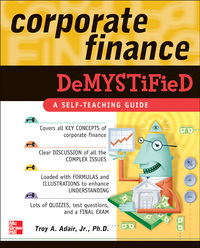Question
During the past years, ABG had limited its investment plans due to high cost of capital. Recently, however, the cost of capital seems to have
During the past years, ABG had limited its investment plans due to high cost of capital. Recently, however, the cost of capital seems to have fallen, and the management of the company is seriously considering the implementation of two major investment plans. Assume that you are the assistant of the ABG's financial director, who has assigned you to calculate the company's cost of capital. Your financial manager has provided the following information:
1. The corporate tax rate is 20%.
2. The company has issued a total of 11,000 non-callable bond with 3% annual nominal interest rate, the coupon of which is paid to the bond holders every six months. These bonds expire after 5 years, have a par value of 1,000 and are currently being traded at 1,030.40.
3. The current price of ABG's preferred stock on the stock market is 3.4 and the company has issued a total of 834,000 shares. The preferences share has a par value of 1 and a 20% dividend yield upon the par value, distributed to the stockholders twice a year. In case of issuance of new preferred share capital, the issue and disposal costs will be 0.30 per share.
4. The current market price of ABG's common stock on the stock market is 3.7 and the company has issued 3,835,000 shares. ABG's most recent dividend (Do) was 0.22 per share and dividends are expected to grow at a steady 2% annual rate for the foreseeable future. The beta coefficient of ABG is 1.4, the long-term government bond offer investors a yield of 2%, and the Expected Return of the Market is estimated to be 6%.
To help you with your task, the Financial Manager of the company has asked you to answer the following questions:
a. What is the (pre-tax) cost of the ABG bond loan and what is the final, after tax, cost of the loan capital to be included in the estimation of ABGs weighted average cost of capital?
b. What is the cost of the company's preferred share capital?
c. What is the cost of ABG's common equity capital using the Capital Asset Pricing (CAPM) model?
d. What is the cost of ABG's common equity capital, using the dividend discount model?
e. What is ABG's Weighted Average Cost of Capital (WACC)? (Assume that the cost of equity capital is the average value of the two methods of c and d)Explain whether the dividend policy of a company affects its value, by describing the various theories that have been put forward in the literature. Provide for each theory at least two references from published papers in scientific journals (approximately 1,000 words).
Step by Step Solution
There are 3 Steps involved in it
Step: 1

Get Instant Access to Expert-Tailored Solutions
See step-by-step solutions with expert insights and AI powered tools for academic success
Step: 2

Step: 3

Ace Your Homework with AI
Get the answers you need in no time with our AI-driven, step-by-step assistance
Get Started


